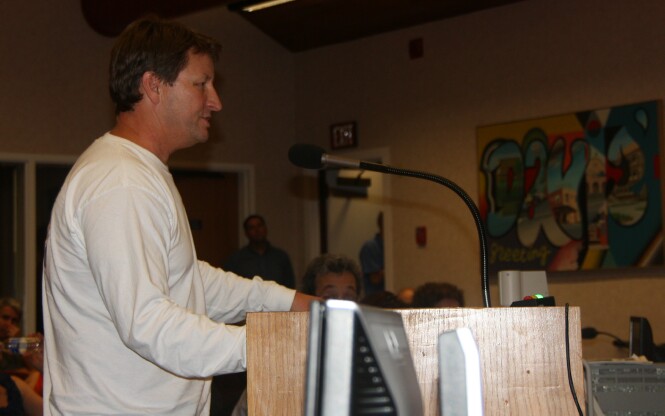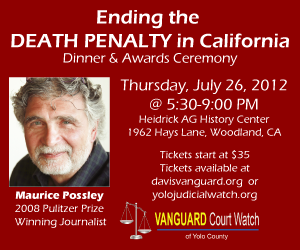 A few weeks ago, the Vanguard, through a public records act request and a subsequent lawsuit against the city of Davis, obtained a less redacted version of the Davis Fire Report that was originally presented to the public in January of 2009.
A few weeks ago, the Vanguard, through a public records act request and a subsequent lawsuit against the city of Davis, obtained a less redacted version of the Davis Fire Report that was originally presented to the public in January of 2009.
The most revealing new detail was newly released accounts of the April 2007 promotional process in which the city would promote two employees to the position of captain. The Davis Enterprise on Wednesday covered this story and was able to get former Fire Chief Rose Conroy to speak on the record on this for the first time.
In April of 2007, then Chief Conroy promoted Union President Bobby Weist, over “at least one of the candidates [who] was demonstrably and significantly more qualified for and deserving of the promotion than [Bobby Weist] promoted by Chief Conroy.”
The Davis Enterprise reports, “Conroy explained last week, however, that Aaronson failed to recognize that a position isn’t won or lost based solely on performance on a test.”
“It seemed to me that Aaronson’s problem with our process was that he believed the best test-taker should be the person promoted,” Ms. Conroy explained. “The best test-taker is not necessarily the best-qualified candidate.
“I believe it’s my responsibility to look at work history, evaluation of their performance in actual high-pressure emergencies, essentially everything they’ve done in their career at the Davis Fire Department.
“I spent over 30 years working in the department, 16 as the fire chief. I hired most of the employees at that time and I don’t believe there was anyone in the city or someone they could have hired from the outside that would have had better insight to these variables than I did at the time.”
However, investigator Bob Aaronson, whose official title has recently been changed to Police Auditor to better reflect the work he does with the city in evaluating citizen complaints against police officers, called this the area where employees became most disgruntled with the former chief and the department.
Mr. Aaronson wrote, “In fact, the single most common starting place where employees become disgruntled is in connection with the promotional process. To the extent that certain circles believe that favoritism is a cornerstone in Chief Conroy’s department, their key proof is based upon their perception of how the promotional process has worked.”
“Apparently, Chief Conroy has been aware of this perception for some period of time. This is part of the reason why she is at such pains, during each process, to meet with the candidates and go over, in great detail, how the process works,” he wrote adding: “Having spent time discussing the details of the last promotional process with Chief Conroy, I do believe that she does not see that her actions have biased the result. But they have, as an examination of the question reveals.”
The first battery of tests were conducted at an off-site all-day assessment center. Wriote Mr. Aaronson, “Each candidate appears before four separate panels: the first runs a fire scenario for the candidate to interact with and demonstrate his/her skills in directing firefighting resources; the second is a training demonstration that the candidate must prepare and then present; the third is an interpersonal scenario where a candidate is expected to appropriately handle a personnel matter; the fourth is a writing exercise where the candidate is directed to write about one of the three prior scenarios. The final aspect of the assessment center is a multiple choice test.
The top of the candidates scored over 90 percent in the assessment, the bottom scored 71%. “Bobby Weist finished nine with 75%,” Mr. Aaronson reported in information newly released.
“The sheets from the division chiefs show that they agreed on the ranking of all but two candidates; their sixth and seventh rankings are reversed. In all other respects, they are identical,” Mr. Aaronson reported. “The union vice president was ranked second by both of them and the union president was ranked fourth.”
Mr. Weist, in his response to the Davis Enterprise, downplayed the significance of this, as well.
“Weist said the more complete report doesn’t explain anything new about the situation. He added that he believes he has demonstrated himself capable of carrying out the captain’s duties,” the Enterprise reported.
“I do know that the position that I attained as captain is a leadership position and I think I’ve shown myself as a leader for 30 years as president of the union,” he said.
Mr. Aaronson wrote that no one questions Mr. Weist’s skills or abilities, however, “a significant number of firefighters, including some who were not otherwise disgruntled, believed that one particular candidate was far more deserving than Bobby Weist – the individual who finished fourth and first and in the second tier (in the assessment center of the division chiefs’ interviews and the chief’s final ranking, respectively).”
The former chief defends her practice, arguing as indicated above, “The best test-taker is not necessarily the best-qualified candidate.”
She ignores the fact that the process was so flawed that the Grand Jury itself ordered the city to re-examine its promotion testing and selection process. The city’s entire process was revamped, though it was acknowledged the biggest problems with it were within the fire department.
Key portions of the process have been removed from the auspices of the hiring department and put into the hands of Human Resources, who screens applicants for minimum qualifications.
The policy now reads, “The Police and Fire Departments in conjunction with Human Resources will perform additional testing in the form of assessment panels.”
The policy adds, “Those failing the assessment panels will no longer be considered and will not move forward to the department. All applicants passed forward by Human Resources will be given in alphabetical order and all must be interviewed by the Department Head of the hiring department.”
Under the current system, the fire department would have had the top three “test-takers” to evaluate for promotion rather than the entire field.
The chief’s explanation ignores the question of why she can ignore the testing results, that are meant to narrow the field with criteria that are as objective as possible to avoid the appearance of favoritism and level the playing field.
If former Chief Conroy or anyone else is allowed to promote Bobby Weist or anyone, even though they have essentially failed these tests, which scoring 9th out of 10 candidates essentially does, then why have the tests to begin with?
Mr. Weist ignores the problem here, as well. The question, as even Mr. Aaronson noted, is not that he was not qualified, it is that someone else was objectively and demonstrably more qualified and was passed up because of either Mr. Weist’s position as union president or his close relations with the chief.
The fact that Mr. Weist would not have been promoted under current city policies speaks volumes to the impropriety of what happened in 2007.
—David M. Greenwald reporting

It’s really five years too late for Chief Conroy to say anything meaningful about how she handled this selection. The city process has changed so that no future chief is allowed to do what she did. While her actions were legal at the time, no amount of arguing the “merits” of the flawed process can make them right, proper or effective management.
As much a story in this report incident is the council’s action in refusing to read the findings. The Vanguard and the Enterprise missed this follow up by not interviewing Sue and Stephen about how that dereliction of council duty happened. The city attorney, city manager and council members still need to answer for their shocking behavior in 2007.
So, the Enterprise took weeks to finally get David’s accomplishment reported. And it ends up being mostly an opportunity for Rose Conway to attempt to defend the undefendable–her selection of an applicant who wouldn’t even qualify in today’s’ process (corrected specifically in response to complaints about what she did.
Conway’s only support in this delayed explanation effort are the unconvincing statements of the person who got his promotion through her blatant favoritism.
Thank goodness the Enterprise was gracious in crediting the Vanguard’s excellent investigation for the Enterprise having any story to cover. But, in kind of awkward wording. But, in the 40th paragraph. (The very last one.)
Great work, David.
Nice investigative reporting to get the facts that should have been released years ago. Also, I want everyone to know that Davis and his attorney risked a lot to file and prosecute that public records act case. Great work!
“Nice investigative reporting to get the facts that should have been released years ago. Also, I want everyone to know that Davis and his attorney risked a lot to file and prosecute that public records act case. Great work!”
Agree with your commendations. But, what are you talking about, that David and his attorney risked anything?